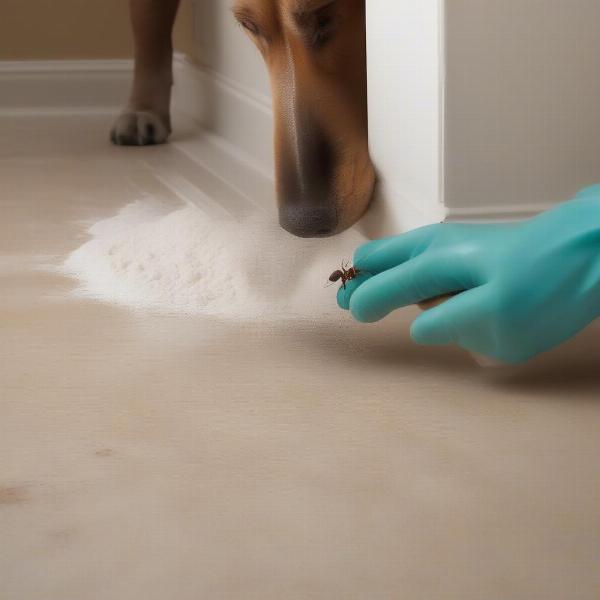Ants are a common household nuisance, but many commercial ant killers contain chemicals that are toxic to dogs. Finding a dog friendly ant killer is crucial for pet owners who want to eliminate ants without risking their furry friend’s health. This article will guide you through safe and effective ant control methods, ensuring your home is pest-free while keeping your canine companion safe and sound.
Understanding the Risks of Conventional Ant Killers
Many over-the-counter ant killers contain ingredients like permethrin, fipronil, and hydramethylnon, which can be harmful or even fatal to dogs if ingested or absorbed through the skin. Symptoms of ant killer poisoning in dogs can range from mild irritation to seizures, tremors, and even death. Therefore, it’s essential to choose a dog friendly ant killer or opt for natural, pet-safe methods.
Natural and Dog Friendly Ant Killer Solutions
Fortunately, there are several natural and dog friendly ant killer options that effectively eliminate ants without posing a threat to your pet.
-
Diatomaceous Earth (Food Grade): This natural powder consists of fossilized diatoms and works by dehydrating ants. Sprinkle it around ant trails and entry points, keeping it out of your dog’s reach as it can cause respiratory irritation if inhaled in large quantities.
-
White Vinegar: A simple solution of equal parts water and white vinegar can disrupt ant trails and deter them from returning. Spray the solution directly on ants and along their paths. The strong smell will dissipate quickly, leaving your home smelling fresh and clean.
-
Boiling Water: For ant nests outdoors, pouring boiling water directly onto the nest can effectively eliminate the colony. Ensure your dog is kept away from the area while you are pouring the water and until it has cooled down.
-
Lemon Juice: Similar to vinegar, the acidity of lemon juice disrupts ant trails. Mix equal parts lemon juice and water and spray around areas where you see ants.
-
Essential Oils: Certain essential oils, such as peppermint and tea tree oil, repel ants. Mix a few drops with water and spray around your home. However, use these oils with caution and in well-ventilated areas, as some essential oils can be toxic to pets if ingested. Always consult with your veterinarian before using essential oils around your pets.
 Applying Diatomaceous Earth for Ant Control
Applying Diatomaceous Earth for Ant Control
Preventing Ant Infestations
Preventing ants from entering your home in the first place is the best defense. Here are some proactive steps you can take:
-
Cleanliness: Regularly clean up food crumbs and spills, especially in the kitchen and dining areas.
-
Food Storage: Store food in airtight containers to prevent ants from accessing it.
-
Seal Entry Points: Seal cracks and crevices in walls and windows where ants can enter.
-
Remove Standing Water: Ants are attracted to moisture, so eliminate any standing water around your home.
Commercial Dog Friendly Ant Killers
While natural methods are often effective, some commercial dog friendly ant killers are available. Look for products that are specifically labeled as safe for pets and contain natural ingredients like boric acid or essential oils. Always follow the manufacturer’s instructions carefully.
What to Do If Your Dog Ingests Ant Killer
If you suspect your dog has ingested ant killer, contact your veterinarian or a pet poison control center immediately. Symptoms of ant killer poisoning can vary depending on the type of insecticide ingested and the amount consumed. Prompt veterinary care is crucial for a positive outcome.
Conclusion
Keeping your home ant-free doesn’t have to come at the expense of your dog’s safety. By choosing dog friendly ant killer methods and taking preventative measures, you can protect your pet while effectively managing ant infestations. Always prioritize your dog’s well-being and consult with your veterinarian if you have any concerns about pest control products or your dog’s health.
FAQ
-
What are the signs of ant killer poisoning in dogs? Symptoms can include vomiting, diarrhea, tremors, seizures, lethargy, and loss of appetite.
-
Is baking soda a dog friendly ant killer? While baking soda is generally considered safe for dogs, it’s not very effective at eliminating ants.
-
How long does diatomaceous earth take to kill ants? It can take several days or even weeks for diatomaceous earth to completely eliminate an ant infestation.
-
Can I use essential oils directly on my dog to repel ants? No, never apply essential oils directly to your dog’s skin. Some essential oils are toxic to pets and can cause serious health problems.
-
What should I do if I find an ant nest in my yard? You can pour boiling water on the nest or use a pet-safe commercial ant killer designed for outdoor use. Keep your dog away from the treated area.
-
Are all natural ant killers safe for dogs? Not necessarily. Some natural ingredients, like certain essential oils, can be toxic to pets. Always research thoroughly before using any new product around your dog.
-
How can I prevent ants from coming back after treatment? Maintaining cleanliness, sealing entry points, and storing food properly are key to preventing future ant infestations.
- Internal Links: is roundup safe for dogs after drying, duck dog grass, round up safe for dogs, weed and feed and dogs
ILM Dog is your trusted source for expert advice on dog care and wellbeing. We offer a range of resources covering breed selection, health, training, nutrition, grooming, and much more. Our mission is to provide pet owners with the knowledge and tools they need to ensure their dogs live long, healthy, and happy lives. For any questions or further assistance, please contact us at [email protected] or call us at +44 20-3965-8624. Visit ILM Dog for more valuable information.